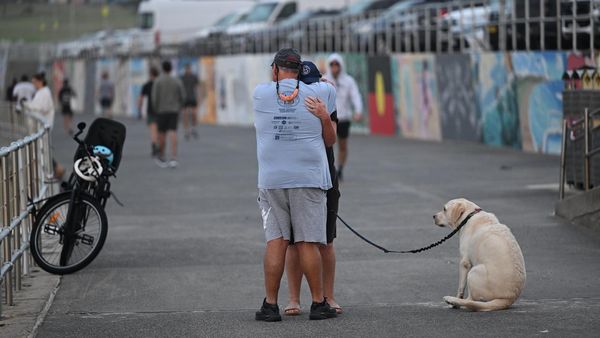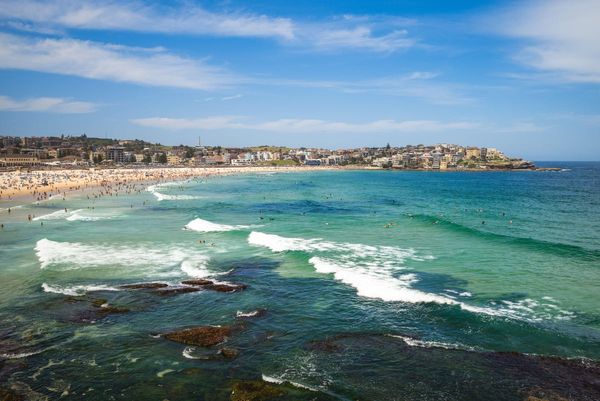Hundreds of thousands of Yemenis took to the streets in several cities on Friday to condemn the US and UK strikes on their country, in response to weeks of disruptive attacks on Red Sea shipping by Iran-backed Houthi rebels, who say they act in solidarity with Palestinians in Gaza.
Crowds under a sea of Yemen and Palestinian flags chanted "Death to America, death to Israel" as they massed in the giant Sanaa square in the historic city's centre.
"If America and its allies decide to declare open war on us, we're ready for it and we won't have any choice but to bring victory or fall as martyrs," Abdel Azim Ali, one of the protesters, told AFP.
"We're waiting for the day when we're fighting a war with America," said Mohammed Hussein, another demonstrator.
"We're not scared of the American or British air force. We've been bombed for nine years and another attack is nothing new for us," said Abdallah Hassan, who was also in the crowd.
The air strikes add to escalating fears of wider conflict in the region, where violence involving Tehran-aligned groups in Yemen as well as in Lebanon, Iraq and Syria has surged since the Israel-Hamas war began in early October.
UK and US interests now 'legitimate targets' for Yemen
The Iran-backed rebels' Supreme Political Council threatened retaliation after the overnight attacks on dozens of military targets in Houthi-held territory.
"The Americans and the British should not believe that they will escape the punishment of our heroic armed forces," the Houthis' Supreme Political Council said in a statement on their official media.
"All American-British interests have become legitimate targets for the Yemeni armed forces in response to their direct and declared aggression against the Republic of Yemen."
United Nations Secretary-General Antonio Guterres called on all sides "not to escalate" the volatile situation in the Red Sea, his spokesman said on Friday.
"The Secretary General further calls on all parties involved not to escalate even more the situation in the interest of peace and stability in the Red Sea and the wider region," said Guterres' spokesman Stephane Dujarric.
Hamas said it will hold Britain and the United States "responsible for the repercussions on regional security."
"Your strikes on Yemen are terrorism," said Mohammed Ali al-Houthi, a member of the Houthi Supreme Political Council, referring to the United States. "The United States is the Devil."
The US, Britain and eight other allies said the strikes aimed to "de-escalate tensions". But Iran and numerous other countries in the region and beyond condemned the Western action or voiced concern that unrest could worsen.
Turkish President Recep Tayyip Erdogan described the strikes as "disproportionate" and said: "It is as if they aspire to turn the Red Sea into a bloodbath."
News of the air strikes sent oil prices up four percent. Bjarne Schieldrop, chief commodities analyst at SEB bank, cited market fears that "the region is on an unpredictable escalating path".
The Houthis have carried out a growing number of attacks on what they deem to be Israeli-linked shipping in the key Red Sea international trade route since October 7, when Hamas's unprecedented attack on Israel sparked the war still raging in the besieged Gaza Strip.
Some 12 percent of global maritime trade normally passes through the Bab al-Mandeb strait, but since mid-November the amount of shipping containers has dropped by 70 percent, according to maritime experts.
The rebels have controlled a major part of Yemen since a civil war erupted there in 2014 and are part of a regional Iran-backed "axis of resistance" against Israel and its allies.
Friday's strikes targeted an airbase, airports and a military camp, the Houthis' Al-Masirah TV station said, with AFP correspondents and witnesses reporting they could hear heavy strikes in Hodeida and Sanaa.
The British Ministry of Defence said four RAF Typhoons hit a site in northwestern Yemen in Bani, used to launch attack drones, as well as an airfield in Abbs from where cruise missiles and drones were operated over the Red Sea.
'Dire consequences'
"Our country was subjected to a massive aggressive attack by American and British" forces, said Hussein al-Ezzi, the rebels' deputy foreign minister.
According to official Houthi media, he added the two countries "will have to prepare to pay a heavy price".
US President Joe Biden on Thursday called the strikes a "defensive action" after the Red Sea attacks and said he "will not hesitate" to order further military action if needed. Biden went on to call Yemen's Houthi forces a "terrorist" group on Friday.
With fighter jets and Tomahawk missiles, 60 targets at 16 Houthi locations were hit by more than 100 precision-guided munitions, US Central Command said in a statement.
Unverified images on social media, some of them purportedly of Al-Dailami airbase north of the rebel-held capital Sanaa, showed explosions lighting up the sky as loud bangs and the roar of planes sounded.
Houthi military spokesman Yahya Saree said at least five people had been killed.
Nasser Kanani, spokesman for Iran's foreign ministry, said the Western strikes "will have no result other than fuelling insecurity and instability in the region", while "diverting the world's attention" from Gaza.
An AFP journalist said hundreds of people rallied in Tehran against the US, Britain and Israel while voicing support for Gazans and Yemenis.
Protesters also marched in Yemen's Gulf neighbour, Bahrain.
Saudi Arabia's foreign ministry said Riyadh "is following with great concern the military operations" and called for "self-restraint and avoiding escalation".
The kingdom is trying to extricate itself from a nine-year war with the Houthis, though fighting has largely been on hold since a truce in early 2022.
Oman, a mediator in attempts to end Yemen's civil war, said it "has warned several times about the risk of the extension of the conflict in the region".
Iraq and Syria voiced similar concerns.
'Repeated warnings'
Further afield, China said it was "concerned about the escalation of tensions in the Red Sea" and Moscow condemned the "illegitimate" strikes.
Biden called the strikes a success and said he ordered them "against a number of targets in Yemen used by Houthi rebels to endanger freedom of navigation in one of the world's most vital waterways."
He said the rebels' "unprecedented" attacks included "the use of anti-ship ballistic missiles for the first time in history".
British Prime Minister Rishi Sunak said the Houthis' breach of international law merited a "strong signal" in response.
"People can't act like this with impunity," he said, adding the Houthi attacks were "disrupting the global economy".
Britain's defence ministry released footage of Royal Air Force jets returning to their Cyprus base after the mission, and US Centcom video showed warplanes apparently taking off from a sea-based carrier.
US Defence Secretary Lloyd Austin said the strikes "targeted sites associated with the Houthis' unmanned aerial vehicle, ballistic and cruise missile, and coastal radar and air surveillance capabilities".
The Houthis said they will not be deterred. Houthi spokesman Mohammed Abdulsalam posted on X that "there is absolutely no justification for this aggression against Yemen".
Years of air raids
As the rebels have weathered years of air raids by a Saudi-led coalition, hitting them would have little impact and would only raise their standing in the Arab world, Gerald Feierstein, a former US ambassador to Yemen, said before the strikes.
"The Houthis are immune to air strikes," agreed Maged Al-Madhaji, co-founder of the Sanaa Center for Strategic Studies think-tank.
US and allied forces in Iraq and Syria, where they are part of an anti-jihadist coalition, have also faced stepped-up attacks since the Israel-Hamas war began, with Washington responding to several by bombing the sites of pro-Iran groups.
Israel has also hit targets in Syria, and has exchanged regular fire with Lebanon's Hezbollah over its northern border.
Washington in December announced a maritime security initiative, Operation Prosperity Guardian, to protect shipping in the Red Sea.
On Tuesday, however, the Houthis launched what London called their most significant attack yet, with US and British forces shooting down 18 drones and three missiles.
The intensifying attacks have caused shipping companies to divert around South Africa's Cape of Good Hope, affecting trade flows at a time when supply strains are putting upward pressure on inflation globally.
(FRANCE 24 with AFP, Reuters)







